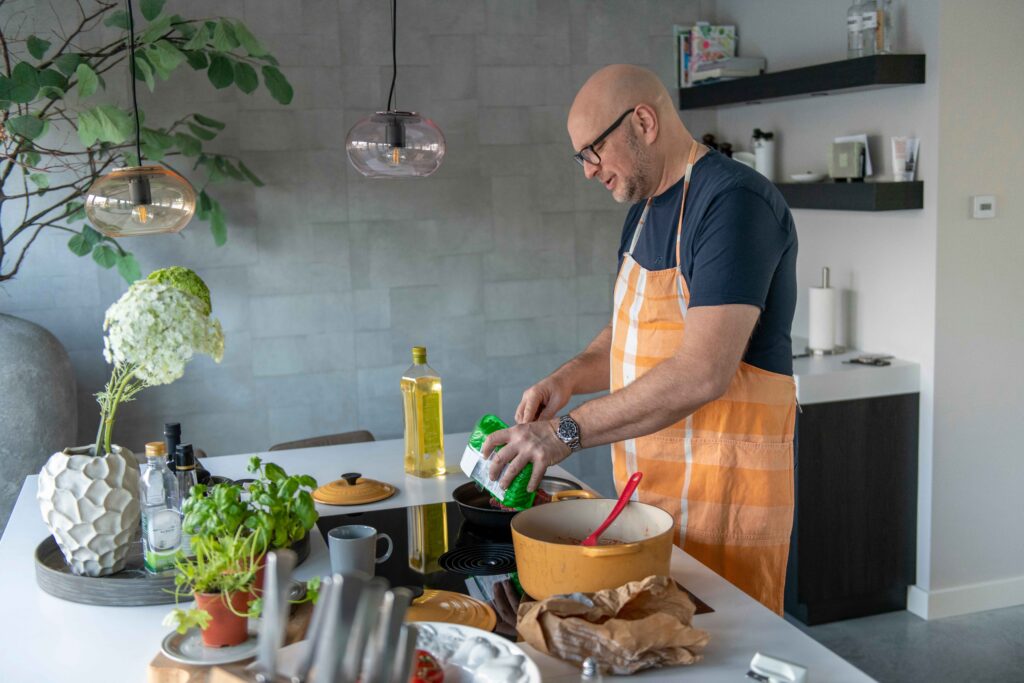Introduction: The Art of a Healthy Marriage
The Essence of Being a Good Husband
In the journey of marriage, nurturing and maintaining a healthy relationship is akin to tending a garden. It requires patience, care, and the understanding that growth happens over time, not overnight. Just as a garden needs sunlight, water, and good soil to thrive, a marriage needs love, respect, and communication to flourish. But what does it mean to be a great husband? It’s a question that many have pondered, and the answers can be as varied as the individuals involved.
Beyond Basic Responsibilities
Being a great husband goes far beyond the primary responsibilities of partnership. It’s not just about providing for the family or being a good listener, though these are essential aspects. It involves a deeper level of commitment and a willingness to put in the conscious effort and dedication required to make the relationship thrive. This means actively working to understand your partner’s needs, desires, and fears and being willing to adapt and grow together.
Embracing Change Together
The role of a husband is not static; it evolves as life brings new challenges and opportunities for growth. Whether navigating the complexities of parenting, supporting each other through career changes, or finding new ways to connect and communicate, being a great husband means being ready to face these changes head-on, with love and a willingness to work together.
This blog post will explore nine essential qualities and actions that contribute to being a great husband. These are not exhaustive nor prescriptive; they inspire and guide those looking to deepen their connection with their partner and build a more fulfilling relationship. Remember, every couple is unique, and what works for one may not work for another. The most important thing is to remain open, communicative, and committed to each other’s happiness and well-being.

1. Effective Communication
Communication is the cornerstone of any strong relationship, and this holds especially true in marriage. Open, honest, and respectful communication fosters trust and understanding between partners, creating a safe space where both individuals feel valued and heard. It’s about more than just talking; it’s about connecting on a deeper level and sharing your thoughts, feelings, and aspirations in a way that strengthens the bond between you.
The Significance of Open, Honest, and Respectful Communication
Effective communication goes beyond merely exchanging information; it involves sharing your inner world with your partner. This openness paves the way for genuine understanding and empathy, helping to prevent misunderstandings and resolve conflicts healthily. Honesty, when tempered with kindness, reinforces trust. At the same time, respectful communication ensures that even difficult conversations can be navigated without harming the relationship.
Tips for Improving Listening Skills
- Practice Active Listening: Focus entirely on your partner when speaking, without formulating your response while they talk. Show that you are listening and engaged by nodding, making eye contact, and providing verbal affirmations.
- Avoid Interruptions: Let your partner express their thoughts fully before you respond. Interrupting can make them feel unheard and diminish the importance of their feelings.
- Seek to Understand: Understanding your partner’s perspective before offering advice or counterpoints. You can do this by paraphrasing their words and asking clarifying questions.
Tips for Expressing Thoughts and Feelings Constructively
- Use “I” Statements: When discussing your feelings or needs, start your sentences with “I” to focus on your own experiences rather than attributing motives or blame to your partner (e.g., “I feel upset” rather than “You made me upset”).
- Be Clear and Specific. Vague statements can lead to misunderstandings. Be clear about your feelings, why, and what you need from your partner.
- Timing is Key: Choose the right moment to have meaningful conversations. Avoid starting discussions when you are stressed, tired, or distracted.

2. Emotional Support
At the heart of a nurturing marriage is the ability to provide unwavering emotional support to one another. Being emotionally available and supportive isn’t just about being there during the trials and tribulations; it’s equally important during the joyous moments and achievements. This dual presence underscores the depth of your commitment and love, ensuring your partner feels seen, heard, and valued in every aspect of life.
The Importance of Being Emotionally Available and Supportive
Emotional support involves more than just offering a shoulder to cry on. It encompasses being present and engaged with your partner, regardless of the situation. During challenging times, it provides a foundation of strength and resilience, helping your partner feel less alone and more capable of facing whatever comes their way. In good times, celebrating successes and happy moments together deepens your connection and reinforces the joy in your shared journey.
Being emotionally supportive helps to build a secure attachment between partners, fostering a sense of safety and trust that is vital for a healthy relationship. It means recognizing that your relationship is a haven from the outside world, where vulnerabilities can be exposed without fear of judgment.
Suggestions for Understanding and Responding to Your Partner’s Emotional Needs
- Practice Empathy: Try to put yourself in your partner’s shoes and see the world from their perspective. This can help you understand their feelings and respond in a supportive way.
- Ask Open-Ended Questions: Encourage your partner to express their feelings by asking questions that require more than a yes or no answer. For example, “How did that make you feel?” or “What can I do to support you?”
- Validate Their Feelings: Let your partner know their feelings are valid and understandable. Validation can be as simple as saying, “It makes sense that you feel that way,” or “I would feel the same in your situation.”
- Offer Physical Comfort: Sometimes, words aren’t necessary. A hug, a gentle touch, or sitting close can provide immense emotional support.
- Be Patient: Understand that emotions can be complex, and your partner might not always be ready to talk or know precisely how they feel. Give them the time they need to process their emotions.

3. Sharing Responsibilities
In the marriage dance, sharing household and parenting responsibilities is about fairness, teamwork, respect, and supporting each other’s well-being. When both partners actively participate in these roles, it fosters a balanced relationship where both individuals feel valued and acknowledged. This collaborative approach strengthens the foundation of your partnership, making it more resilient to the stresses of daily life.
The Importance of Sharing Responsibilities
Sharing responsibilities is crucial for several reasons:
- It prevents resentment from building up over perceived inequalities in the workload. When one partner feels overburdened, it can lead to tension and conflict.
- It allows both partners to feel equally invested in the home and family life, creating a sense of unity and shared purpose.
- It models positive behaviour for the family’s children, teaching them about cooperation, respect, and gender equality.
Examples of How to Effectively Divide Tasks and Work as a Team
- Communicate and Negotiate: Begin by having an open conversation about the distribution of responsibilities. Be honest about your preferences, strengths, and limitations. Negotiate a fair division of tasks that considers both partners’ workloads and personal strengths.
- Create a Schedule or To-Do List: Visual aids can help track who is doing what and when. Whether it’s a shared digital calendar or a physical to-do list on the fridge, find a system that works for both of you.
- Be Flexible. Life is unpredictable, and sometimes, responsibilities need to be temporarily reassigned. Approach these situations with flexibility and a willingness to help each other out.
- Show Appreciation: Regularly acknowledge and thank each other for the work done. Feeling appreciated can be a significant motivator and strengthens the bond between partners.
- Set Boundaries: It’s crucial to balance shared responsibilities with individual needs and limits. Be clear about what you can realistically take on and communicate when feeling overwhelmed.
- Involve the Whole Family: If you have children, involve them in age-appropriate household chores. This not only lightens the load but also teaches them valuable life skills.

4. Continuous Affection
Continuous threads of love and affection give the tapestry of marriage warmth and beauty. Regular expressions of love and affection do more than make your partner feel good at the moment; they reinforce the bond between you, creating a robust and enduring connection that weathers the ups and downs of life together.
Strengthening the Bond Through Affection
Expressions of affection serve as constant reminders of the love and appreciation that you have for each other. These gestures, both big and small, build a reservoir of goodwill and positive feelings, making it easier to navigate conflicts and misunderstandings when they arise. Affection also fosters an environment of security and trust where both partners feel valued and important.
Simple Yet Meaningful Ways to Show Affection Daily
- Leave Love Notes: A heartfelt note in a lunchbox, on the bathroom mirror, or beside the bed can brighten your partner’s day and remind them of your love.
- Use Touch: Physical touch, whether holding hands, a hug, or a gentle caress, can convey affection powerfully without words.
- Verbal Affirmations: Regularly express your love, gratitude, and admiration for your partner. Simple phrases like “I love you,” “I appreciate you,” or “I’m grateful for you” can mean a lot.
- Small Acts of Kindness: Doing something thoughtful for your partner, such as making them a cup of coffee in the morning or taking care of a chore they dislike, shows that you care about their happiness and well-being.
- Quality Time: Make it a point to spend uninterrupted time together, doing activities you enjoy. This dedicated time is a powerful way to show your partner they are a priority.
- Surprise Gestures: Occasionally surprise your partner with something they love, whether it’s their favourite meal, a gift, or planning a date night. Surprises add excitement and show thoughtfulness.
- Listen Actively: Giving your full attention when your partner is talking shows that you value their thoughts and feelings, reinforcing your emotional connection.

5. Quality Time Together
In the hustle and bustle of daily life, it’s easy for couples to drift apart, with each person caught up in their routines and responsibilities. However, spending quality time together is essential for maintaining and deepening the connection between partners. Quality time is the glue that holds the relationship together, allowing you to create shared experiences, understand each other better, and keep the spark alive.
The Importance of Quality Time
Quality time is not just about being in the same space but being truly present with each other, free from distractions like phones, work, or other obligations. This dedicated time helps to reaffirm your commitment to each other and reminds you of why you chose to be together in the first place. It’s an opportunity to communicate, share, laugh, and grow together, strengthening the foundation of your relationship.
Ideas for Date Nights, Hobbies, or Activities
- Themed Date Nights at Home: Create themed evenings where you cook a meal together based on a particular cuisine, watch a movie from a specific country, or dress up for the occasion. It’s a fun way to explore new experiences from the comfort of your own home.
- Outdoor Adventures: Whether it’s hiking, biking, or picnicking in a local park, spending time in nature can be both rejuvenating and bonding.
- Learn Something New Together: Sign up for a class or workshop that interests both of you. It could be anything from dance lessons to cooking classes or even learning a new language.
- Game Night: Break out board or card games for a little friendly competition. Games are a great way to laugh and engage with each other light-heartedly.
- Volunteer Together: Find a cause you care about and volunteer your time. It’s a meaningful way to spend time together while giving back to your community.
- Travel and Explore: Plan daily trips to explore nearby towns or more extended vacations to new destinations. Travelling together creates lasting memories and shared experiences.
- Quiet Nights Sometimes, quality time can be as simple as enjoying a quiet evening together, reading books side by side, or listening to music. The key is to be present and enjoy each other’s company.

6. Respect and Appreciation
In marriage, showing respect and appreciation for each other’s contributions and qualities is not only necessary but essential for the health and longevity of the relationship. Respect lays the foundation for mutual understanding and esteem, while appreciation fuels each partner’s sense of value and belonging. Together, they create a positive feedback loop that nurtures love, deepens trust, and enhances intimacy.
The Crucial Role of Respect and Appreciation
Respect involves acknowledging your partner as an individual with their thoughts, feelings, and needs. It means treating them with kindness, considering their perspective, and valuing their contributions to the relationship and household, regardless of their nature or size.
On the other hand, appreciation is about recognizing and expressing gratitude for what your partner does, big and small. It’s about seeing the effort they put into the relationship and the family and letting them know it doesn’t go unnoticed.
Together, respect and appreciation prevent feelings of being taken for granted, one of the common pitfalls in long-term relationships. They reinforce that both partners are valued and essential, fostering a supportive and loving environment.
Tips for Regularly Acknowledging and Appreciating Your Partner’s Efforts
- Express Gratitude Verbally: Make it a habit to say “thank you” for everyday things, not just grand gestures. A simple acknowledgement of the effort your partner puts into daily tasks can go a long way.
- Leave Appreciation Notes: Surprise your partner with notes of thanks or love in unexpected places, like their wallet, the bathroom mirror, or the car dashboard.
- Public Praise: Compliment and praise your partner in front of others. Acknowledging their qualities and contributions publicly boosts their self-esteem and shows your respect and admiration.
- Dedicate Time to Listen: Show respect by giving your full attention when your partner speaks without distractions. Listening is a powerful way of showing you value their thoughts and feelings.
- Offer Help and Support: Actively look for ways to lighten your partner’s load, such as taking on more household chores or providing emotional support during challenging times.
- Celebrate Achievements: Acknowledge and celebrate your partner’s achievements, both within and outside the relationship. It shows you’re paying attention and proud of their accomplishments.
- Regular Check-ins: Have regular conversations about each other’s needs and feelings. This practice demonstrates respect for your partner’s experiences. It provides an opportunity to express appreciation for how they navigate challenges and successes.

7. Keeping the Romance Alive
Maintaining intimacy and romance is crucial in any long-term relationship. Over time, the initial excitement of a new romance may give way to the comfort and routine of daily life, but keeping the spark alive is essential for a fulfilling partnership. Intimacy and romance are the elements that transform a simple coexistence into a deep and passionate connection, reminding partners of the unique bond they share.
The Significance of Intimacy and Romance
Intimacy and romance are about more than physical closeness; they encompass emotional connection, mutual vulnerability, and the ongoing discovery of each other’s desires and dreams. They are the language of love that says, “You are special to me” and “I choose you, again and again.” Keeping the romance alive reinforces the commitment and attraction between partners, ensuring the relationship continues growing and flourishing.
Creative Ideas for Keeping the Spark Alive
- Surprise Dates: Plan unexpected outings or experiences based on your partner’s interests. Whether it’s a picnic in the park, tickets to a show they’ve wanted to see, or a surprise dinner at their favourite restaurant, the key is the element of surprise and thoughtfulness.
- Thoughtful Gestures: Small, thoughtful acts can have a significant impact. Leave a loving note in their bag, send a sweet text during the day, or bring home their favourite treat just because. These gestures show you’re thinking of them.
- Open Conversations about Desires: Regularly discuss your desires, fantasies, and anything else that could enhance your intimacy. This open dialogue fosters a deeper emotional connection and ensures both partners feel heard and fulfilled.
- Scheduled Date Nights: Commit to regular date nights, even if it’s a quiet evening at home without distractions. This dedicated time is vital for reconnecting and focusing on each other.
- Travel Together: Exploring new places can reignite your relationship’s sense of adventure and excitement. Plan trips that cater to shared interests, creating new memories.
- Try New Activities Together: Engage in new hobbies or activities together. Learning and growing together can be a bonding experience, and fresh energy can be injected into your relationship.
- Intimate Time: Prioritize physical closeness and affection. From holding hands to more intimate expressions of love, these moments are vital to maintaining a strong emotional and physical connection.

8. Growth and Support for Personal Goals
A thriving relationship cherishes the bond between partners and respects and supports their journeys. Supporting each other’s personal growth and goals is vital for a healthy partnership. It signifies a deep level of love and respect, acknowledging that each person is a unique individual with dreams and aspirations that extend beyond the relationship.
The Importance of Supporting Personal Growth and Goals
Encouraging your partner’s personal growth and ambitions demonstrates selfless love. You find joy in their success and fulfilment, independent of your own. This support strengthens the relationship by building mutual respect and admiration. It shows that you’re invested in their happiness and well-being, not just how they contribute to your life or the relationship. Such support can also lead to a more dynamic and enriching relationship, as both partners bring new experiences and perspectives back into their shared lives.
Advice on Encouraging and Helping Your Partner Pursue Their Interests and Ambitions
- Listen Actively to Their Dreams: Show genuine interest in your partner’s goals and dreams. Ask questions and listen without judgment or unsolicited advice, providing a safe space for them to share and explore their ambitions.
- Offer Encouragement: Regular encouragement can be a powerful motivator. Celebrate their successes, no matter how small, and offer reassurance during setbacks.
- Help Create Space and Time: Practical support is often as valuable as emotional support. Help them create the time and space they need to pursue their goals, whether by taking on a bit more at home or helping them find the right resources.
- Be Their Cheerleader: Remind your partner of their strengths and abilities, especially when self-doubt creeps in. A belief in their potential can be a significant source of encouragement.
- Encourage Learning and Development: Support their pursuit of new skills or knowledge, whether signing up for a course together, reading relevant materials, or attending workshops and seminars.
- Set Goals Together: While supporting individual goals is essential, setting joint goals can strengthen your bond. These could be related to health, hobbies, or financial planning, reflecting a shared vision for your future.
- Respect Their Independence: Recognize that personal growth sometimes requires independence. Please show your support by respecting their need for time alone to pursue their interests or by encouraging them to spend time with friends who share their passions.

9. Trust and Honesty
Trust and honesty are at the core of every solid and enduring relationship. These elements are the bedrock upon which all other aspects of a healthy partnership are built. Without trust, the fabric of intimacy, communication, and mutual respect unravels. In turn, honesty nurtures and strengthens that trust, ensuring that the relationship can withstand the tests and trials of time.
The Foundation of Trust and Honesty
Trust is confidence in your partner’s reliability and integrity, believing they will act in the relationship’s best interest. It’s about feeling secure, knowing that your partner is truthful and that they will honour their commitments and promises. Honesty complements trust by being honest and transparent in all interactions with your partner. It involves being open about your feelings, thoughts, and actions, even when difficult.
Ways to Build and Maintain Trust
- Be Reliable: Show your partner that you can be counted on. Consistency in your actions and behaviours is vital to proving your reliability over time.
- Keep Promises: Follow through on your commitments, no matter how small. Breaking promises can quickly erode trust, but keeping them strengthens your bond.
- Maintain Integrity: Act with integrity both within and outside the relationship. This means being honest and upright in all your dealings, which reflects positively on the trust in your relationship.
- Communicate Openly and Honestly: Share your thoughts, feelings, and concerns with your partner. Honesty, even about complex topics, fosters trust and understanding.
- Admit Mistakes and Apologise: Everyone makes mistakes, but admitting them and seeking forgiveness is crucial. It demonstrates accountability and the desire to maintain trust.
- Respect Privacy: Trust also involves respecting each other’s privacy and boundaries. Balancing openness and maintaining a healthy respect for personal space is vital.
- Support Each Other: Being supportive in easy and challenging times shows you are dependable, further building trust.
- Build a History of Positive Experiences: Trust grows over time through shared experiences. Focus on creating positive memories together to strengthen your bond.

Conclusion
In the journey of marriage, being a great husband is about much more than fulfilling roles or obligations. It’s about continuously working on the aspects of partnership that foster a deep, loving, and lasting relationship. We’ve explored nine key areas vital for nurturing this bond:
- Effective communication
- Emotional support
- Sharing responsibilities
- Continuous affection
- Quality time together
- Respect and appreciation
- Keeping the romance alive
- Growth and support for personal goals
- The foundational elements of trust and honesty
Each area offers unique opportunities for growth, understanding, and deepening the connection with your partner. By focusing on these aspects, you become a better husband and contribute to a thriving, fulfilling partnership.
Remember, the goal is not perfection but progress; a commitment to improvement and understanding can make all the difference.
Good luck.
